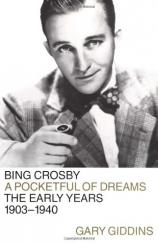Bing Crosby: A Pocketful of Dreams: The Early Years, 1903-1940
Review
Bing Crosby: A Pocketful of Dreams: The Early Years, 1903-1940
In the introduction to BING CROSBY: A POCKETFUL OF DREAMS, Gary Giddins writes: "A performer of such enormous popularity becomes, inevitably and in spite of himself, a social critic. Crosby, an unreasonably modest man who never took credit for anything musical, let alone social or political, nonetheless played a coercive role in the acceleration of civil rights." Thus, he sets the tone in this paean to one of the wonderful entertainers of all time.
That so much talent should reside in one person seems unfair. Singer, actor, businessman, sportsman --- Crosby was one of the lucky people on whom fortune smiled several times.
Harry Lillis Crosby was born into middle class society. His family endured some financial difficulties, but nothing so harsh as to force any of the Crosby kids to quit school to put food on the table. Bing was the type of student you'd want your kid to be: smart, popular, talented, yet Giddins can't seem to make up his mind when he discusses young Crosby's scholastic achievements. On the one hand, he garnered all sorts of recognition for his schoolwork; on the other, he is depicted as being an underachiever. In fact, he was studying to be a lawyer when the lure of a musical career became too strong to resist.
Even as a child growing up in Spokane, Crosby had a voice and a personality that was destined for entertaining. He took part in school plays, readings, musical productions and, not unlike modern day youngsters, dreamed of being in a band. He took his chances and was a founding member of the Rhythm Boys trio, setting out to make their fortune along the west coast.
Giddins portrays Crosby as the kind of man you would want for a friend. Funny, smart, loyal, modest. He could also be contentious, stubborn and evidently had a bit of a drinking problem, though not quite bad enough for Giddins to label him an alcoholic.
He was driven by ambition. Well-received live performances begat recording contracts which begat movie appearances which begat radio shows. All along the way he found time for his recreation: race horses (he opened his own race track), fishing and, most of all, golf (the Bing Crosby Pro-Am Tournament was the first and has become the most famous of all such events).
The knock on Crosby throughout the years was that he was not the best family man. If there is any truth to that, Giddins gives it short shrift, passing it off that he wasn't a bad father and husband. POCKETFUL OF DREAMS covers only Crosby's first wife, Dixie, who had problems of her own. Although she was the one who managed to make Crosby "reform" from his imbibing ways, she took to the bottle herself, perhaps as a means of coping with the loneliness that ensued from his constant work.
Giddins is also the author of biographies on Louis Armstrong and Charlie Parker, and here he supplies in-depth analyses of the music, probably more than the average reader can handle.
POCKETFUL OF DREAMS follows Crosby practically every step along his way to stardom. And this might be a drawback. Attention to detail --- names, places, dates ---- may be too much for the casual fan. For the Crosby afficionado, however, it's manna from heaven, man.
Reviewed by Ron Kaplan (ronk23@aol.com) on January 21, 2011
Bing Crosby: A Pocketful of Dreams: The Early Years, 1903-1940
- Publication Date: January 25, 2001
- Genres: Biography, Nonfiction
- Hardcover: 736 pages
- Publisher: Little, Brown and Company
- ISBN-10: 0316881880
- ISBN-13: 9780316881883




